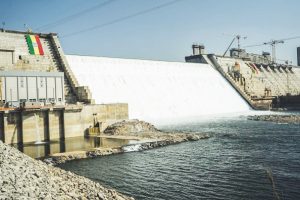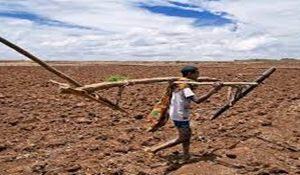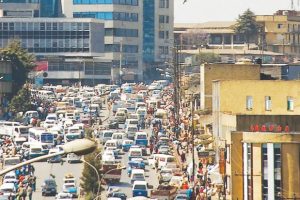BY EPHREM ANDARAGCHEW
Fertilizer is a natural or artificial substance containing chemical elements that improve the growth and productiveness of plants. Fertilizers increase the natural fertility of the soil or replace chemical elements taken from the soil by previous crops.
Fertilizer is important to increase yield and ensure healthy produce by supplying the right balance of nutrients to the soil. Without fertilizers, the soil would be depleted and therefore plants would be particularly difficult to grow. Water alone is not enough for the survival of plants. If human beings want good nutritious food, plants need nutrition and that makes our food much more enjoyable.
Among the others, soil fertilizer is important to Ethiopia. Soil fertility is the quality of a soil that enables it to provide compounds in adequate amounts and proper balance to promote the growth of plants when other factors (such as light, moisture, temperature, and soil structure) are favorable. Where fertility of the soil is not good, natural or manufactured materials may be added to supply the needed plant nutrients. These are called fertilizers, although the term is generally applied to largely inorganic materials other than lime or gypsum.
Currently, soil fertilizer is one of the most significant factors in gaining better yields in the nation’s agricultural sector. Nevertheless, the rising prices of fertilizer in the world market create challenges for Ethiopia. It is also becoming a worrisome issue for farmers in some parts of the country.
According to the Ethiopian Shipping and Logistic Service Enterprises vice Chief Executive Siraj Abdullah, the central warehouse has received 372,000 tons of fertilizer from 8 ships, of which 330,000 tons are being delivered to the regional 107 access points for regional unions and cooperatives and agro-ecology.
Ethiopian Shipping and Logistic Service Enterprises Uni-modal Director Eskedar Hailu explained that the enterprise has been transporting imported fertilizer for the 2022/2023 agriculture season by train and land since last January.
The country has a plan to import more than 1.2 million metric tons of fertilizer for this production season. From this, more than 372,000 metric tons of soil fertilizers have so far been transported to the Djibouti port and 286,000 metric tons have been imported to 120 destinations in the country. Furthermore, the enterprise has been working with various stakeholders to use the vehicle and train to deliver the fertilizer to the farmers, she added.
However, efforts are underway to import and deal out soil fertilizers, but so far the farmers who needs the fertilizers haven’t gotten as they wish. Ethiopian Shipping and Logistic Service Enterprises chief executive officer (CEO) Roba Megersa said that despite the procurement delay, the shipping enterprise shall manage the dispatch as soon as possible unless aid cargo suddenly arrives.
“The fertilizer along with bulk cargos like relief and market stabilization wheat come at a similar time, it would be a challenge to transport cargos to the center,” he added.
Taking the challenges into consideration, Ethiopian House of People Representatives Agriculture standing committee Chairperson Solomon Lale said that although the price of fertilizers increases universally, the relevant authorities should collaborate to control and take action against those who illegally increase the price of fertilizers.
He also stressed the need to work together with the Ministry of Agriculture, regional agriculture, and security forces to provide inputs to the delayed fertilizers due to security concerns.
In order to solve the issue, the standing committee suggested finding other means to replace soil fertilizers inside the country. Hence, various efforts are being made by the head of state and kebele, and experts to develop natural fertilizer as an alternative to soil fertilizer.
Farmers in Arsi Zone told local media that they have not been able to obtain the best seeds and fertilizers after completing their field preparation for the fall harvest. So, they are requesting fertilizer. Bekele Yadate, a farmer in Lei Woreda, Arsi Zone, said he has repeatedly plowed his fields and is ready for sowing. He said they have not received any agricultural inputs, including the best seeds and fertilizers so far.
On the bases of this and other related factors, regional states advise and implement alternative mechanisms to replace soil fertilizer with natural fertilizer. According to Amhara Regional State President Dr. Yilkal Kefale, it is difficult to provide soil fertilizer across the region since the price has significantly increased in the global market. Hence, “farmers need to prepare and use natural fertilizers in high quality and quantity to prevent the shortage of supply.”
For this, the farmers should be supported by leaders and professionals at all levels to use natural fertilizer to increase agricultural productivity. Furthermore, leaders and experts at all levels should support the farmers to prepare and use natural fertilizers, he explained.
Looking for alternative fertilizers is indeed a key to ensuring agricultural productivity across the nation. Oromia, Amhara, and Sidama Regional State Agriculture Bureau said that they are working to increase agricultural productivity by replacing soil fertilizers with alternative fertilizers.
Growing agricultural productivity and ensuring food security has been a major focus of the government as Ethiopia has been hit by external pressures and internal problems. As a result, the supply of fertilizer, which is one of the most important agricultural inputs, has faced unprecedented challenges in terms of price, quantity, and time.
Currently, the Regional State Bureau of Agriculture is carrying out the replacement of natural fertilizers to alleviate the problem caused by the shortage of fertilizer supply and price increase. Oromia Agriculture Bureau Deputy Head Getu Gemechu noted that the region needs 8.2 million quintals of fertilizer during the current cropping season, but only 5.5 million quintals will be provided by the Ministry of Agriculture which is not enough.
The fertilizer received by the region is being made available to autumn production areas and work is underway to replace the deficiency with natural fertilizer. However, the price of fertilizer increases more than half compared to the same period last year, the region has been monitoring the situation at the woreda level to prevent further increases in prices by illegal brokers and traders, he added.
Amhara Regional State Agriculture Bureau Head Dr. Hailemariam Kefialew said due to various reasons, the amount and distribution of fertilizer have changed across the region. Hence, the region is considering alternative solutions since the problem is caused by national and international pressure.
Sidama Regional State Agriculture Bureau Head Mesfin Qere said there is no significant gap in the supply of fertilizer in the state, but the price has increased as compared to the same period last year. Therefore, farmers will be encouraged to focus on alternative natural fertilizers.
Focusing on alternative natural fertilizers is imperative since the price of soil fertilizers globally increases and affects developing countries like Ethiopia. Being aware of this, the government and regional states are taking various measures to address the issue which include the preparation of natural fertilizer. Replacing soil fertilizer with natural fertilizer is a good initiative not only for the farmers but also for the youth.
Hence, the government, the regions, and the stakeholders should give due attention to letting youths take part in the preparation and distribution of natural fertilizers since it saves foreign exchange and creates job opportunities for the youths.
The Ethiopian Herald April 17/2022





